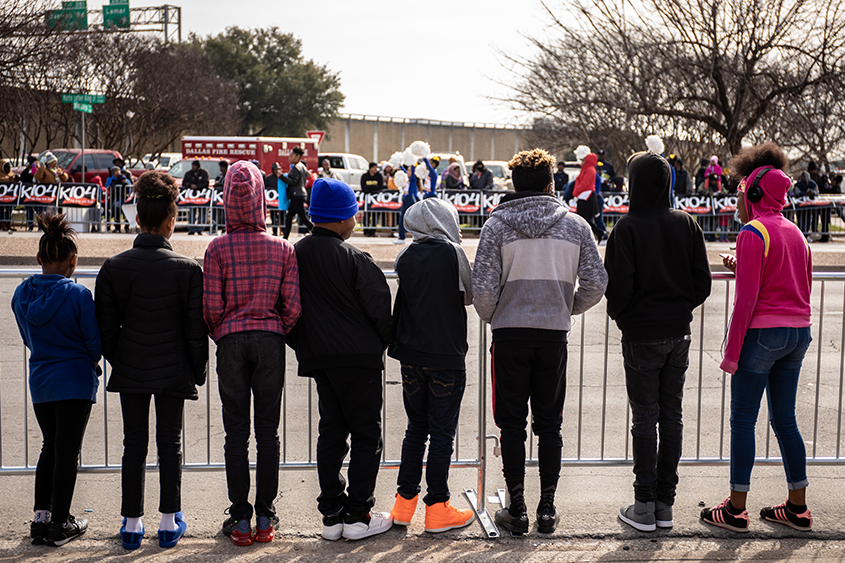We Were, We Are, We Will Be
This article is over six months old and may reference former titles for DBU faculty or staff, discontinued programs, or other details that have since changed. If you have any questions, please contact us at news@dbu.edu, or (214) 333-5172.

The Significance of Commemorating Black History Yesterday, Today, and Beyond
“In recognizing the humanity of our fellow beings, we pay ourselves the highest tribute.” —Thurgood Marshall, first African American U.S. Supreme Court member
Birthed in the midst of the Harlem Renaissance, a period of unparalleled development in African American art, music, literature, theater, and politics, Negro History Week (which later became Black History Month) was founded in February 1926 by Dr. Carter G. Woodson, the second African American to receive a Ph.D. in history from Harvard University. Woodson wholeheartedly believed that the immersive study of black history and culture would be the path to racial uplift and progress.
Not unlike the artists, musicians, dramatists, and writers of the Harlem Renaissance, Woodson understood that recovering, remembering, and re-visioning black history would definitively and unequivocally prove the absolute humanity and inherent equality of black people to all those who had considered these truths questionable and therefore deniable.
Woodson also knew that black history, unfettered by the chains of slavery’s lies regarding the morality, integrity, dignity, and intelligence of black people, would be absolutely necessary for our personal and collective transformation.
Slavery not only connoted the absence of physical freedom for blacks, it proved to be a severe, systematic, and sustained physiological and psychological assault that left its combatants formally uneducated, emotionally scarred, economically impoverished, and spiritually wounded.
For Woodson, black history would be the balm needed to: reconstitute black people’s belief in themselves; ignite and inspire their individual and collective wills to be and to do more than they could conceive possible; and to inoculate them against determined foes and devious forces designed to thwart their potential and forever define them as second-class citizens.
Ninety-three years ago, Carter G. Woodson painstakingly and eloquently made the case for our commemoration of Black history. He focused on the ways in which it would prove our humanity, establish our worth, point to our possibilities, and transform our notion of ourselves so that we might, in turn, transform our realities.
Given our individual and collective successes, our hard-won victories, our advances toward the fullest expressions of liberty, freedom, equality, and justice, we might be tempted to call into question the continued need for commemorating, by any singular or concentrated means, Black history.
After all, we have witnessed the political ascension of the first African American to the presidency of the United States. Hollywood can longer deny the undeniable grace and beauty or forfeit the vast profitability of the black image on the silver screen (because Wakanda truly is forever and Beale Street has spoken). At every turn, we see, hear, taste, and feel the indelible ways The Souls of Black Folk have enriched, enlivened, and enlightened this great land of ours and the entire world.
So let’s return to the central questions: do we still need to highlight Black history or devote ourselves to singular, concentrated studies of African American life and culture?
It is absolutely imperative for all of us to commemorate, reflect upon, and continuously study African American history, life, and culture.
I believe the study of our individual and collective histories has and will continue to hold the keys to unlock the chains that still hold us in bondage to racism and to loosen the ties that keep us bound to parochial prejudices.
Failing to study African American history, and the histories of other disenfranchised and marginalized groups, will ensure that they remain on the periphery. Failing to study African American history is to never know or recognize that Black history did not begin with slavery.
Neglecting the study of African American history is to forget that the quest for our freedom was and is wed with struggle but not bereft of joy and hope. Dismissing black history is to forget the sacrifices of those who were maligned, beaten, jailed, and murdered so that we can attend integrated schools, vote, and have some measure of justice. Denying the significance of African American history is to strengthen the strongholds our ancestors gave their lives to eradicate.
Forfeiting the privilege to study African American history singularly and specifically is to rob our posterity of the knowledge of the great and vast contributions we have made to civil society. Refusing to reflect upon African American history is to be left vulnerable to definitions and perspectives of others.
The truth is that despite all the civil and voting rights, political access, material and social gains we now possess, African Americans, by and large, are still daily called upon to defend our existence, establish our worth, and prove we matter. The truth is that we are still very much in need of the kind of education Carter G. Woodson had in mind.
Essentially, he looked to history, for in it lies a call to both consciousness and conscience. Simply put, history demands that we (individually and collectively) awaken to the complexities of our past so that we are impelled toward right action.
The continued study of African American history, life, and culture is a reflection of our commitment to answer that clarion call to bring about genuine freedom and justice.
Dr. Michelle Henry is an Associate Professor of English for the College of Humanities and Social Sciences at DBU.








